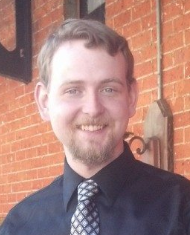Meet the Board: Fred Gold

Fred Gold, Annual Fund Officer, Cleveland Museum of Natural History
Tell us a little bit about where you work and what you do there?
I’m the Annual Fund Officer at the Cleveland Museum of Natural History. That means I oversee all of the appeals and fundraising efforts targeted at individuals up until they hit our major gifts range, when I hand those folks off to a major gift officer. Getting to see my work so directly impact my institution and our mission is really fulfilling, and I’m so glad to be doing what I do.
What is your earliest museum memory?
I took a field trip to the Pacific Science Center in Seattle, WA, when I was in…uh, sixth grade, I think? That’s probably my earliest museum memory. I distinctly remember an interactive where I turned a wheel and it made water flow uphill, and it absolutely blew my mind.
What led you to go into the museum field?
I sort of accidentally found the museum field. I had graduated with a BA in history and political science and been accepted to law school, but was (ironically, given that I ended up in this field) concerned about the high debt-to-income ratio of most graduates just out of law school and elected not to go. I figured I would try some other things before committing to one specific field, and I had really enjoyed the history part of my degree, so I started volunteering at the Puget Sound Navy Museum in Bremerton, Washington.
There I learned about how museums should function within their community and how they can be both places of respite for the world-weary and places of contention for a society that needs to work through some difficult issues. I also liked the actual work—at the time I was in exhibits and collections, and enjoyed that I was essentially telling stories to people to help them think critically about their own world. I asked my supervisors there what it takes to get into the museum field, and they told me about a magical place called the Cooperstown Graduate Program, in Cooperstown, New York, where aspiring museum workers could earn their MA.
Attending CGP was the best decision of my life. It prepared me for the museum field in ways I never would have expected, I made lifelong friends there, and I met some of the people I respect most in this field. It also helps that they have something like a 90%+ job placement rate upon graduation.
In 2015, I went from grad school to the Rock and Roll Hall of Fame in Cleveland, and that was my first paid museum job. I can’t imagine working in another industry anymore.
What is your workspace like?
I have an office with a couple large filing cabinets, a whiteboard on which I keep track of my upcoming deadlines and projects, a corkboard on which I hang personal mementos and pictures, a desk, a laptop, two monitors, and a couple of shelves.
What item in your office can you not live without?
My whiteboard, which keeps me organized, and my coffee cup or Red Bull can, as whichever method of caffeine delivery I’ve chosen that day is an absolute necessity.
Describe your favorite work memory. What was your best day like?
Best memory of my entire career? I was working at the Rock Hall during the Republican National Convention, and there was a show booked with the Brett Michaels Band (Brett Michaels is the lead singer of Poison, and hosted the reality show “Rock of Love”) on the last night. Unfortunately, a lot of the delegates and their families had already left, so the museum was pretty sparsely attended for the show. We closed down the galleries, where I was stationed to do some networking, and had all the staff come into the atrium so the show looked well attended for the photographer and videographer.
After the show, Brett and his band came and hung out with us in our offices for a while. So, I guess my best work memory is getting paid to see a Brett Michaels concert and then hanging out with him and his band afterward.
What does your dream museum look like?
Any museum that serves its community well, strives towards its mission relentlessly, and has happy, healthy, employees is my dream museum. I’m fortunate to be working in a place now that fulfills those requirements.
What is the best advice you have ever received?
“Assume good intent.” This was advice offered to my grad school cohort on our first day of orientation by the director of our program, Dr. Gretchen Sorin. She’s an extremely accomplished person in the museum field, and she has never steered me wrong.
There will be times where your coworkers do something wrong, or a member of your working group drops the ball, or your boss calls you out for something in an awkward setting. Don’t get angry, feel sabotaged, or feel attacked; always assume good intent and give people the benefit of the doubt. It makes you a good leader, a good person, and a great professional.
What are you currently reading?
Mostly work emails, lately. If you’re looking for a recommendation, though, I’d say you should check out:
- “The Autobiography of Malcolm X”
- Stephen King’s “The Dark Tower” series
- Nikki Sixx’s “The Heroin Diaries”
Or, if you’re looking for something applicable in your professional life, “The Change Monster: The Human Forces that Fuel or Foil Corporate Transformation and Change”, by Jeanie Daniel Duck.